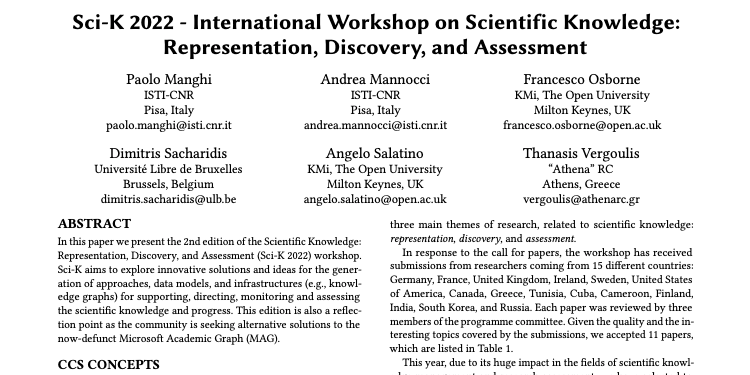“Sci-K 2022 – International Workshop on Scientific Knowledge: Representation, Discovery, and Assessment” is the introductory chapter of the workshop proceedings of “Sci-K 2022 – International Workshop on Scientific Knowledge: Representation, Discovery, and Assessment” co-located with The Web Conference 2022. Paolo Manghi1, Andrea Mannocci1, Francesco Osborne2, Dimitris Sacharidis3, Angelo Salatino2, Thanasis Vergoulis4 1 CNR-ISTI – National […]
Category: Data Mining
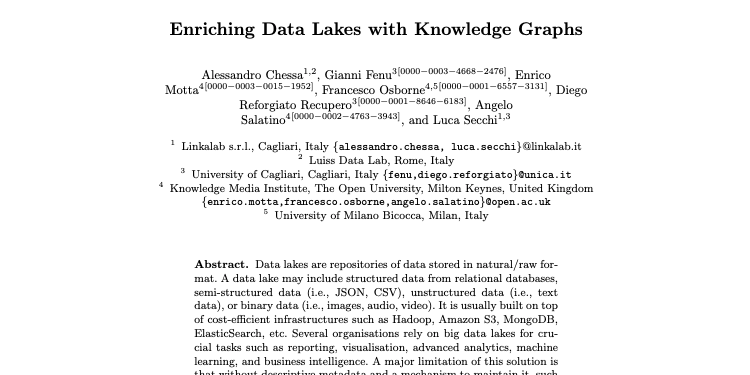
Enriching Data Lakes with Knowledge Graphs
“Enriching Data Lakes with Knowledge Graphs” is a workshop paper published at “Knowledge Graph Generation from Text” co-located with ESWC 2022. Alessandro Chessa1,2, Gianni Fenu3, Enrico Motta4, Francesco Osborne4,5, Diego Reforgiato Recupero3,Angelo Antonio Salatino4, Luca Secchi1 1 Linkalab s.r.l., Cagliari, Italy 2 Luiss Data Lab, Rome, Italy 3 University of Cagliari, Cagliari, Italy 4 Knowledge Media Institute, The […]
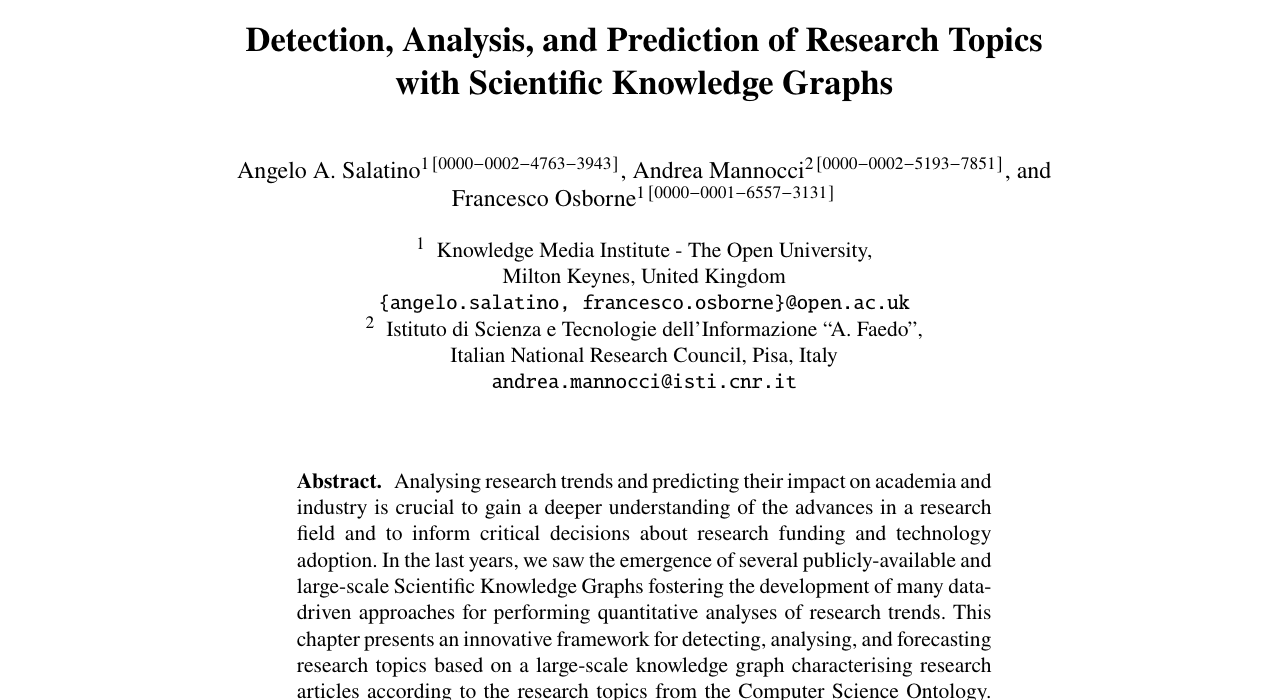
Detection, Analysis, and Prediction of Research Topics with Scientific Knowledge Graphs
“Detection, Analysis, and Prediction of Research Topics with Scientific Knowledge Graphs” is a book chapter of “Predicting the Dynamics of Research Impact” edited by Springer. Angelo A. Salatino1, Andrea Mannocci2, and Francesco Osborne1 1Knowledge Media Institute – The Open University, Milton Keynes, United Kingdom 2Istituto di Scienza e Tecnologie dell’Informazione “A. Faedo”, Italian National Research […]
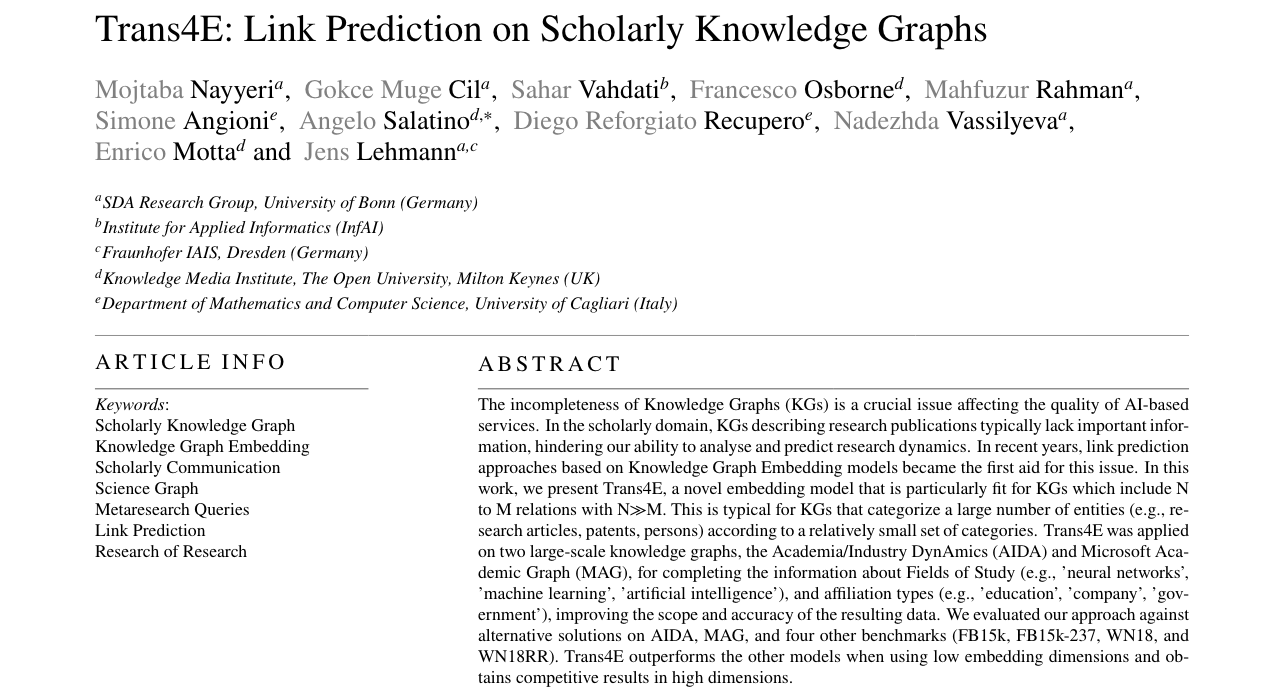
Trans4E: Link Prediction on Scholarly Knowledge Graphs
“Trans4E: Link Prediction on Scholarly Knowledge Graphs” is a journal paper submitted to the Special Issue on “Knowledge Graph Representation & Reasoning” at the Neurocomputing Journal Mojtaba Nayyeria, Gokce Muge Cila, Sahar Vahdatib, Francesco Osborned, Mahfuzur Rahmana,Simone Angionie, Angelo Salatinod, Diego Reforgiato Recuperoe, Nadezhda Vassilyevaa, Enrico Mottad and Jens Lehmanna,c aSDA Research Group, University […]
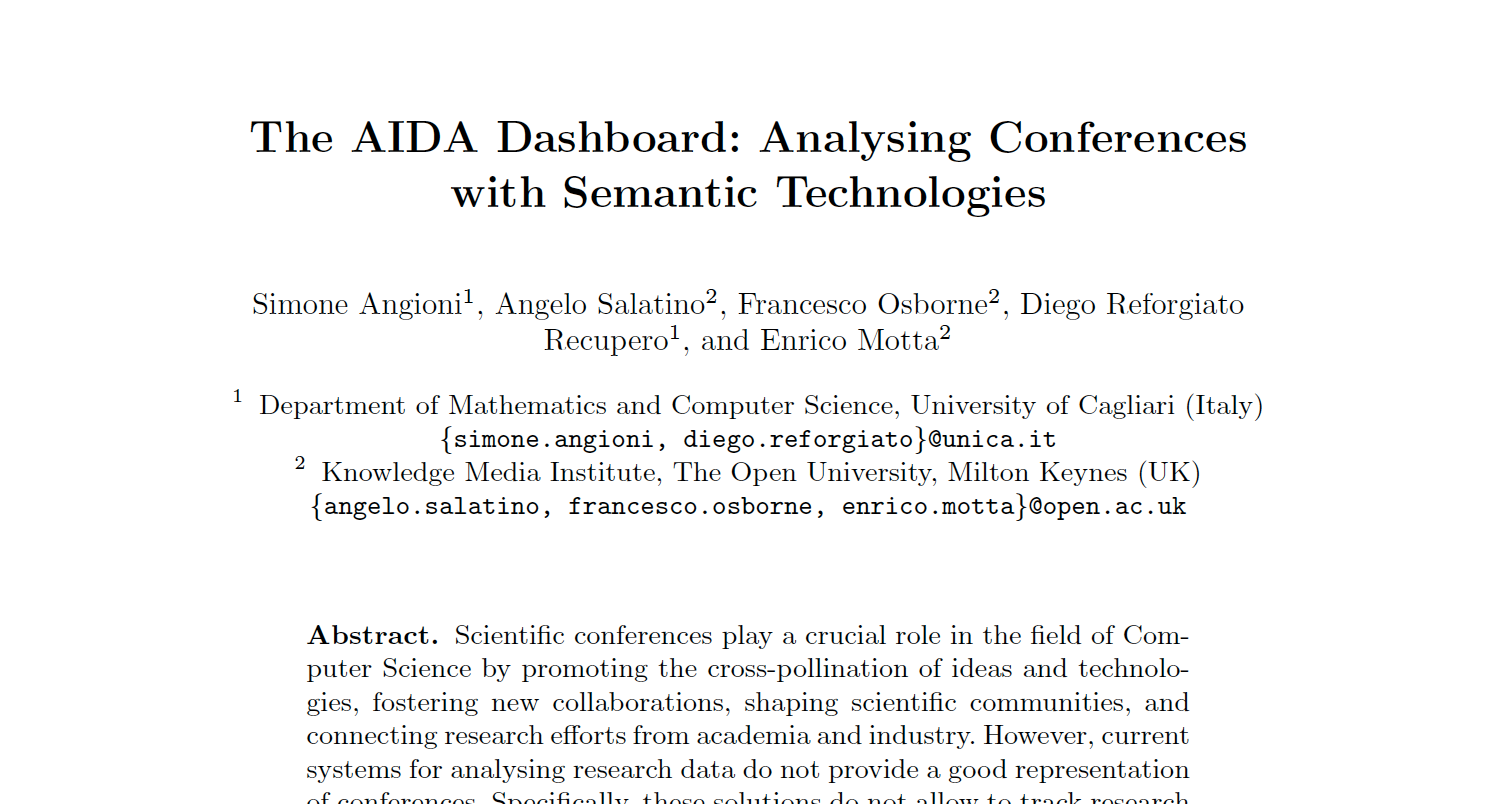
The AIDA Dashboard: Analysing Conferences with Semantic Technologies
“The AIDA Dashboard: Analysing Conferences with Semantic Technologies” is a demo paper submitted to the Posters and Demos tracks of the 19th International Semantic Web Conference. Simone Angioni1, Francesco Osborne2, Angelo A. Salatino2, Diego Reforgiato Recupero1, Enrico Motta2 1 University of Cagliari, Via Università 40, 09124 Cagliari 2 Knowledge Media Institute, The Open University, […]
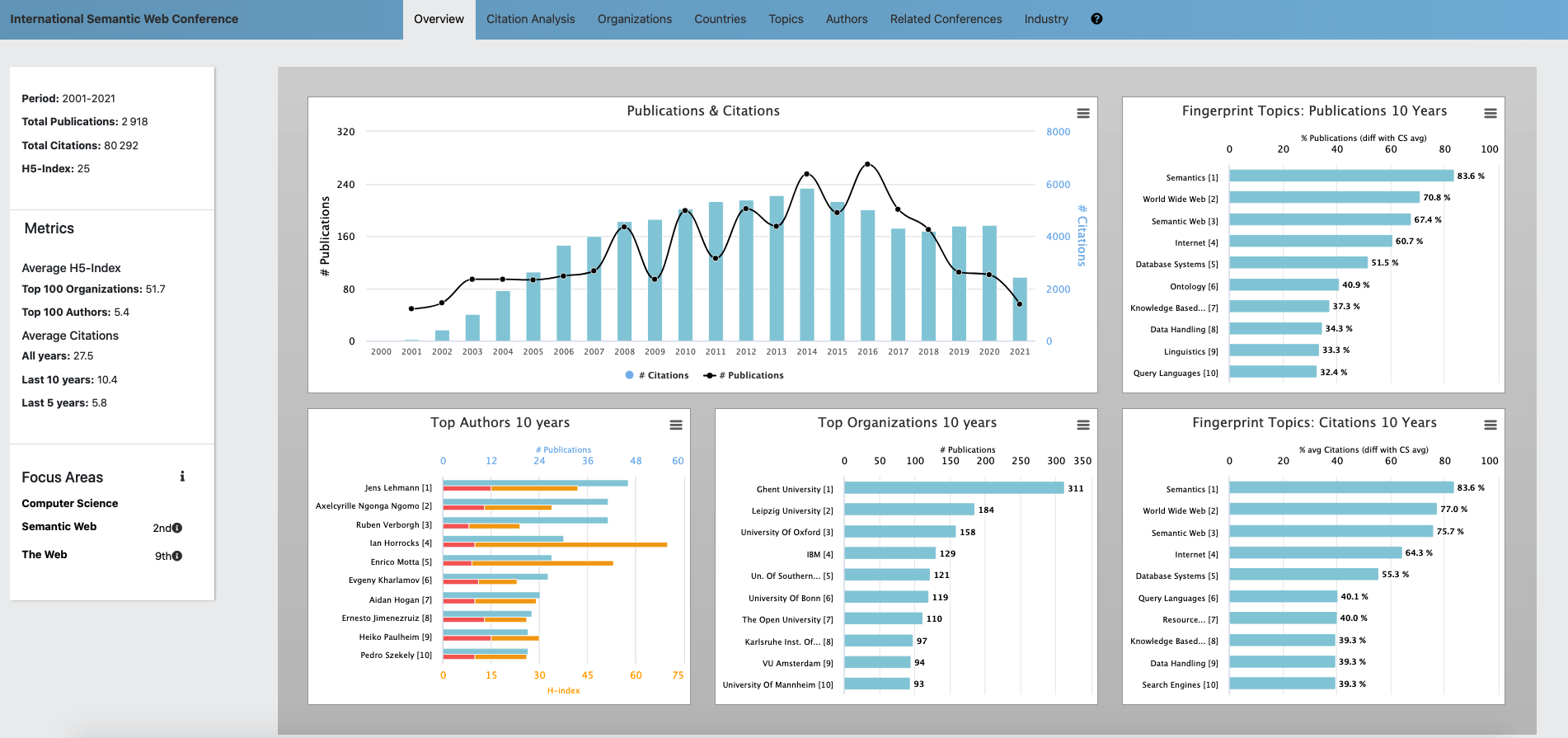
AIDA Dashboard
The AIDA Dashboard is a web application that allows users to visualize several kind of analytics about a specific conference (see Figure 1). The backend is developed in Python, while the frontend is in HTML5 and Javascript. The AIDA Dashboard builds on the Academia/Industry DynAmics knowledge graph (AIDA), a large knowledge base describing 14M articles […]
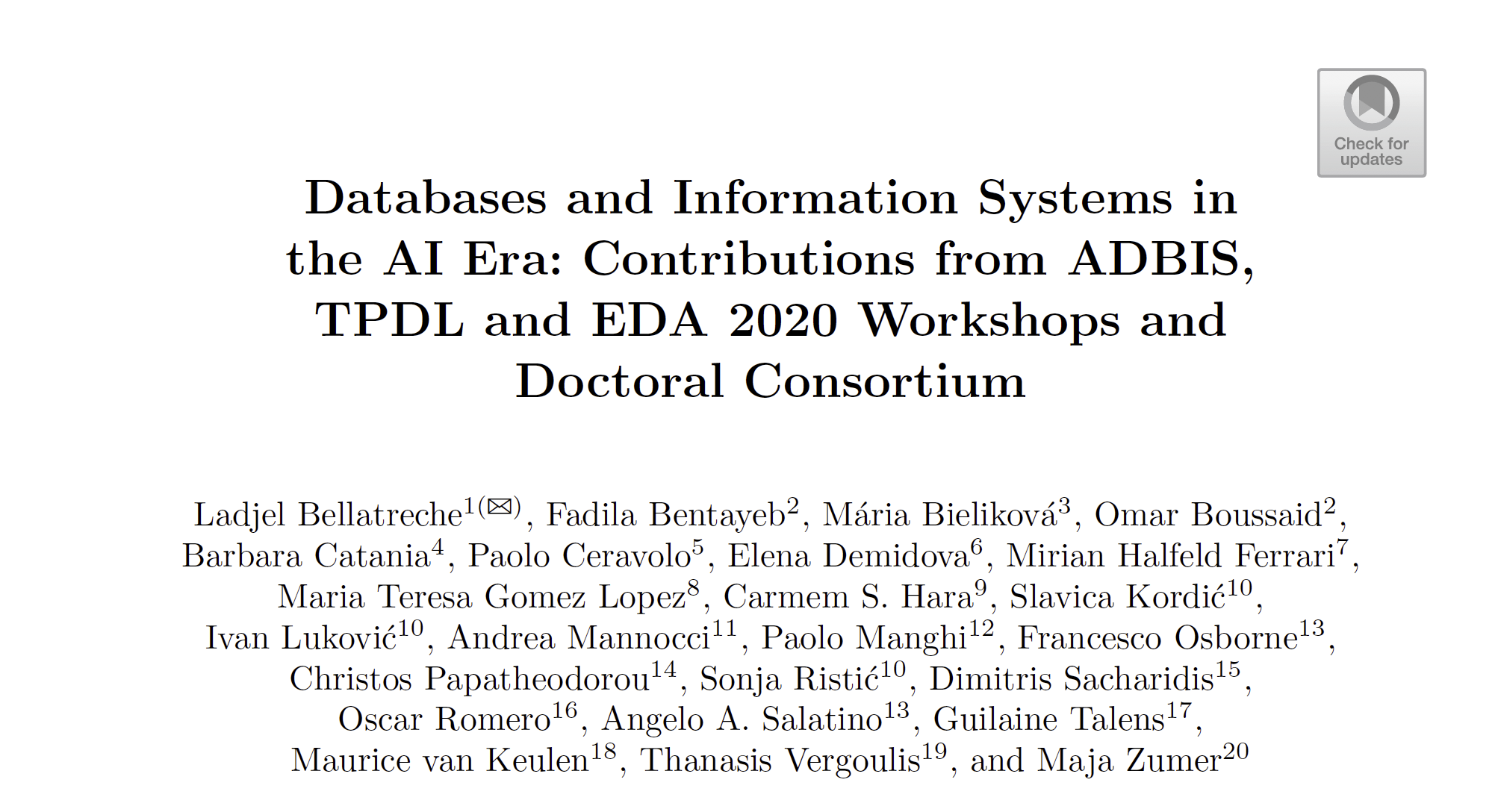
Databases and Information Systems in the AI Era: Contributions from ADBIS, TPDL and EDA 2020 Workshops and Doctoral Consortium
“Databases and Information Systems in the AI Era: Contributions from ADBIS, TPDL and EDA 2020 Workshops and Doctoral Consortium” is the introductory chapter for the ADBIS , TPDL and EDA 2020 Common Workshops and Doctoral Consortium proceedings as satellite events of the 2020 International Conference on Theory and Practice of Digital Libraries (TPDL2020). Ladjel Bellatreche, […]

ResearchFlow: Understanding the Knowledge Flow between Academia and Industry
“ResearchFlow: Understanding the Knowledge Flow between Academia and Industry” is a conference paper submitted to Knowledge Engineering and Knowledge Management – 22nd International Conference, EKAW 2020. Angelo Salatino, Francesco Osborne, Enrico Motta Abstract Understanding, monitoring, and predicting the flow of knowledge between academia and industry is of critical importance for a variety of stakeholders, including governments, funding […]
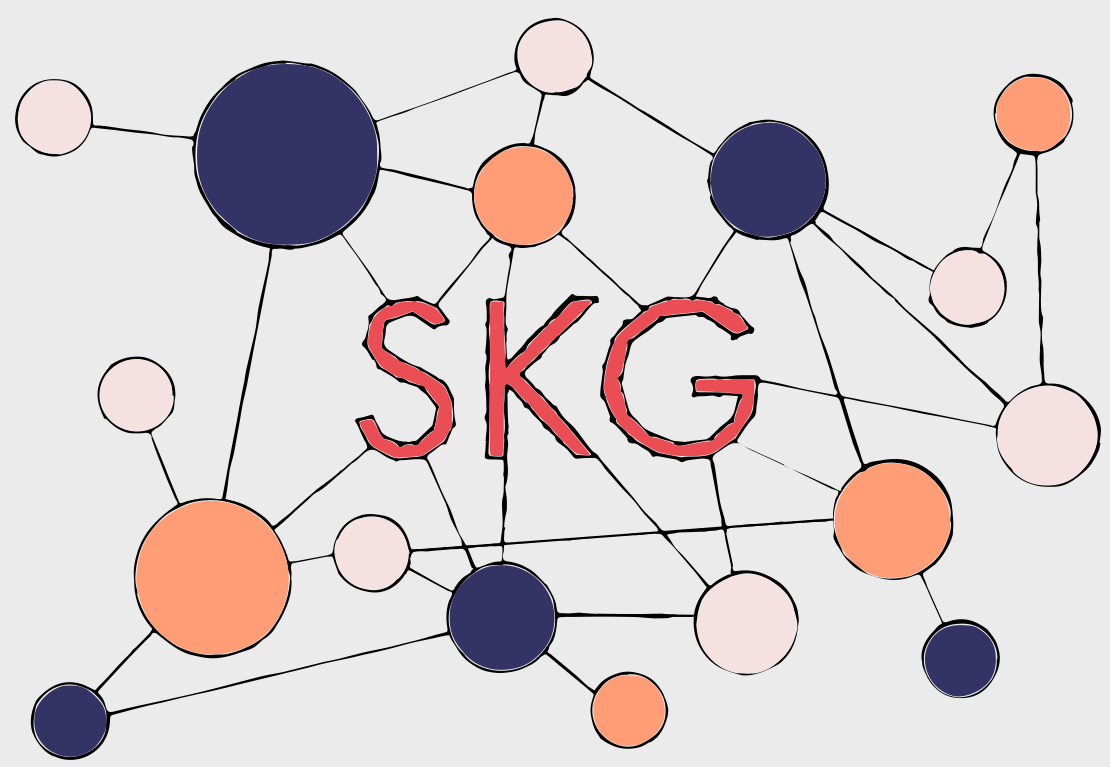
1st Workshop on Scientific Knowledge Graphs (SKG2020)
In the last decade, we experienced an urgent need for a flexible, context-sensitive, fine-grained, and machine-actionable representation of scholarly knowledge and corresponding infrastructures for knowledge curation, publishing and processing. Such technical infrastructures are becoming increasingly popular in representing scholarly knowledge as structured, interlinked, and semantically rich Scholarly Knowledge Graphs (SKG).
The 1st Workshop on Scientific Knowledge Graphs (SKG2020) aims at bringing together researchers and practitioners from different fields (including, but not limited to, Digital Libraries, Information Extraction, Machine Learning, Semantic Web, Knowledge Engineering, Natural Language Processing, Scholarly Communication, and Bibliometrics) in order to explore innovative solutions and ideas for the production and consumption of Scientific Knowledge Graphs (SKGs).
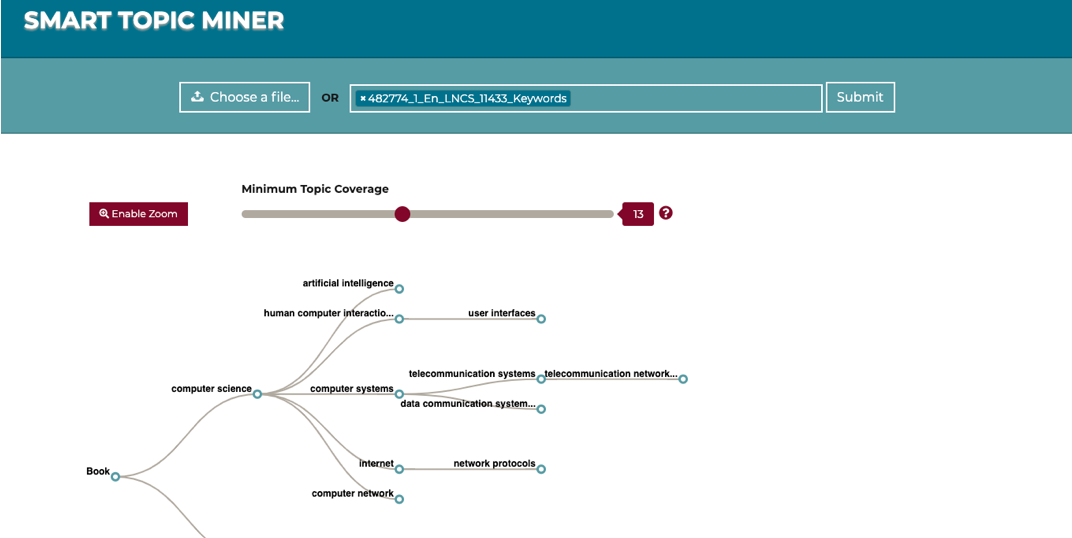
Smart Topics Miner 2: Improving Proceedings Retrievability at Springer Nature
Producing a robust and comprehensive representation of the research topics covered by a scientific publication is a crucial task that has a major impact on its retrievability and consequently on the diffusion of the relevant scientific ideas. Springer Nature, the world’s largest academic book publisher, has typically entrusted this task to the most expert editors, which had to manually analyse new books and produce a list of the most relevant topics. To support Springer Nature in this task, we developed Smart Topic Miner, an application that assists the editorial team in annotating proceedings books according to a large-scale ontology of research areas. Over the past three years, we evolved this application according to the editors’ feedback and developed a new engine, a new interface, and several other functionalities. In this demo paper, we present Smart Topic Miner 2, the most recent version of the tool, which is being regularly utilized by editors in Germany, China, Brazil, and Japan to annotate all book series covering conference proceedings in Computer Science, for a total of about 800 volumes per year.
